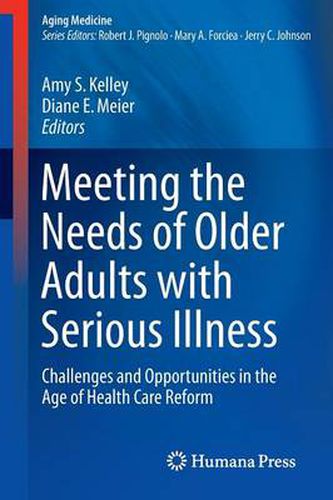Readings Newsletter
Become a Readings Member to make your shopping experience even easier.
Sign in or sign up for free!
You’re not far away from qualifying for FREE standard shipping within Australia
You’ve qualified for FREE standard shipping within Australia
The cart is loading…






This title is printed to order. This book may have been self-published. If so, we cannot guarantee the quality of the content. In the main most books will have gone through the editing process however some may not. We therefore suggest that you be aware of this before ordering this book. If in doubt check either the author or publisher’s details as we are unable to accept any returns unless they are faulty. Please contact us if you have any questions.
Meeting the Needs of Older Adults with Serious Illness: Challenges and Opportunities in the Age of Health Care Reform provides an introduction to the principles of palliative care; describes current models of delivering palliative care across care settings, and examines opportunities in the setting of healthcare policy reform for palliative care to improve outcomes for patients, families and healthcare institutions. The United States is currently facing a crisis in health care marked by unsustainable spending and quality that is poor relative to international benchmarks. Yet this is also a critical time of opportunity. Because of its focus on quality of care, the Affordable Care Act is poised to expand access to palliative care services for the sickest, most vulnerable, and therefore most costly, 5% of patients- a small group who nonetheless drive about 50% of all healthcare spending. Palliative care is specialized medical care for people with serious illnesses. It focuses on providing patients with relief from the symptoms, pain, and stress of a serious illness-whatever the diagnosis or stage of illness. The goal is to improve quality of life for both the patient and the family. Research has demonstrated palliative care’s positive impact on health care value. Patients (and family caregivers) receiving palliative care experience improved quality of life, better symptom management, lower rates of depression and anxiety, and improved survival. Because patient and family needs are met, crises are prevented, thereby directly reducing need for emergency department and hospital use and their associated costs. An epiphenomenon of better quality of care, the lower costs associated with palliative care have been observed in multiple studies.
Meeting the Needs of Older Adults with Serious Illness: Challenges and Opportunities in the Age of Health Care Reform, a roadmap for effective policy and program design, brings together expert clinicians, researchers and policy leaders, who tackle key areas where real-world policy options to improve access to quality palliative care could have a substantial role in improving value.
$9.00 standard shipping within Australia
FREE standard shipping within Australia for orders over $100.00
Express & International shipping calculated at checkout
This title is printed to order. This book may have been self-published. If so, we cannot guarantee the quality of the content. In the main most books will have gone through the editing process however some may not. We therefore suggest that you be aware of this before ordering this book. If in doubt check either the author or publisher’s details as we are unable to accept any returns unless they are faulty. Please contact us if you have any questions.
Meeting the Needs of Older Adults with Serious Illness: Challenges and Opportunities in the Age of Health Care Reform provides an introduction to the principles of palliative care; describes current models of delivering palliative care across care settings, and examines opportunities in the setting of healthcare policy reform for palliative care to improve outcomes for patients, families and healthcare institutions. The United States is currently facing a crisis in health care marked by unsustainable spending and quality that is poor relative to international benchmarks. Yet this is also a critical time of opportunity. Because of its focus on quality of care, the Affordable Care Act is poised to expand access to palliative care services for the sickest, most vulnerable, and therefore most costly, 5% of patients- a small group who nonetheless drive about 50% of all healthcare spending. Palliative care is specialized medical care for people with serious illnesses. It focuses on providing patients with relief from the symptoms, pain, and stress of a serious illness-whatever the diagnosis or stage of illness. The goal is to improve quality of life for both the patient and the family. Research has demonstrated palliative care’s positive impact on health care value. Patients (and family caregivers) receiving palliative care experience improved quality of life, better symptom management, lower rates of depression and anxiety, and improved survival. Because patient and family needs are met, crises are prevented, thereby directly reducing need for emergency department and hospital use and their associated costs. An epiphenomenon of better quality of care, the lower costs associated with palliative care have been observed in multiple studies.
Meeting the Needs of Older Adults with Serious Illness: Challenges and Opportunities in the Age of Health Care Reform, a roadmap for effective policy and program design, brings together expert clinicians, researchers and policy leaders, who tackle key areas where real-world policy options to improve access to quality palliative care could have a substantial role in improving value.